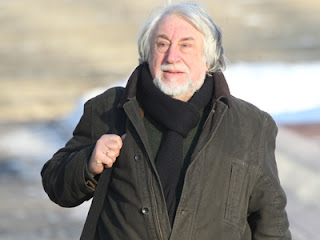Joseph Brodsky, by David Levine (1980) / Image courtesy of NYRB
Last week, The New
Yorker surprised me by running a new translation of a 1967 poem by Joseph Brodsky, “In Villages
God Does Not Live in Corners” («В деревне Бог живет не по углам»). Just when I start to think that Brodsky
has been completely muzzled in English, his estate lets out a little squeak to
remind me that they still have more in store for English readers. Sure, they’ve got a new collected edition in the works, but we’ve been hearing
that line for almost ten years now. That’s a long silence for one of the great
poets of the twentieth century – and a largely untranslated one at that. Let’s hope we see plenty more of his poems in English soon.
Naturally, the magazine has restricted access of the poem only
to its subscribers, but if you squint just right you can make out at least its general
shape. So you’ll have to take my word for it when I say that the translation,
by Glyn Maxwell and Catherine Ciepiela, is masterful. And by that I don’t mean
that they have stuck mechanically to Brodsky’s Russian lines, but that their
translation came alive for me as a new work in English. In terms of prosody, the
form of the poem remains more or less intact in their translation, especially
in the slant rhymes, though they loosened up Brodsky’s iambic pentameter to the
point where it’s no longer audible. Also, they unaccountably chopped up some of
Brodsky’s sentences into fragments. I suppose the fragments are not too terribly
distracting, but I’m still not sure what effect they were seeking to achieve with them.
Most importantly, the tone of Maxwell and Ciepiela’s
translation hits right on the mark. Brodsky’s whimsical countryside theology
comes through loud and clear, and if anything, the translators have even
cranked up the whimsy. My favorite passage comes near the middle of the
sixteen-line poem, when God has migrated from the icon corner to the kitchen:
He’s plentiful. In the iron pot
there.
Cooking the lentils on Saturday.
He sleepily jigs and bops in the
fire,
he winks at me, his witness…
(В деревне Он - в избытке. В чугуне / Он
варит по субботам чечевицу, / приплясывает сонно на огне, / подмигивает мне,
как очевидцу.)
Maxwell and Ciepiela may perhaps have taken an ever-so-slight liberty by jazzing up their God and having him “jig” and “bop” in the fire (in Russian, he
basically just dances in place), but
who can argue with the sound of that phrase? I love it.


